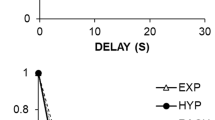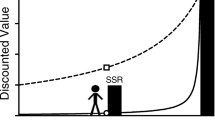Abstract
Impulsive choice refers to the selection of small immediate gains in preference to larger delayed gains, or the selection of large delayed penalties in preference to smaller immediate penalties. Current theoretical interpretations of impulsive choice are reviewed, and a synthesis of these ideas, the ”multiplicative hyperbolic model of choice”, is presented. The model assumes that the value of a positive reinforcer increases as a hyperbolic function of its size, and decreases as a hyperbolic function of its delay and the odds against its occurrence. Each hyperbolic function contains a single discounting parameter which quantifies the organism’s sensitivity to the variable in question. The hyperbolic discounting functions combine multiplicatively to determine the overall value of the reinforcer. Equivalent functions are postulated to govern the (negative) value of aversive events, the net value of an outcome reflecting the algebraic sum of the positive and negative values. The model gives rise to a quantitative methodology for studying impulsive choice, based on a family of linear indifference (null) equations, which describe performance under conditions of indifference, when the values of the reinforcers are assumed to be equal. This methodology may be used to identify individual differences in sensitivity to the magnitude, delay and probability of reinforcement. The methodology is also suitable for the quantitative evaluation of the effects of some pharmacological interventions on discounting parameters. Recent psychopharmacological studies of impulsive choice are reviewed, and the utility of indifference equations for extending this work, and developing a quantitative psychopharmacology of impulsive choice is discussed.
Similar content being viewed by others
Author information
Authors and Affiliations
Additional information
Received: 14 April 1999 / Final version: 6 May 1999
Rights and permissions
About this article
Cite this article
Ho, MY., Mobini, S., Chiang, TJ. et al. Theory and method in the quantitative analysis of ”impulsive choice” behaviour: implications for psychopharmacology. Psychopharmacology 146, 362–372 (1999). https://doi.org/10.1007/PL00005482
Issue Date:
DOI: https://doi.org/10.1007/PL00005482




